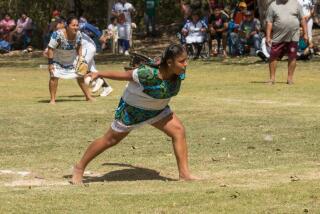Teen commutes daily across border to pursue tennis dream
Katherine Frayre, 14, wakes up at 4 a.m. Monday through Thursday to travel from her home in Tijuana’s Camino Viejo neighborhood to Eastlake in Chula Vista, where she trains in hopes of being a top tennis player.
She makes the journey with her mother, entirely by public transit. They catch a bus on one of Tijuana’s newest lines, all the way to the border. After they pass through San Ysidro’s PedWest crossing, they take a trolley to another bus. If there’s a short line at the border, the commute takes about three hours. A long line can add another hour or two.
“I want to be one of the top 10 in the world,” Katherine said, standing at the bus stop near her home in Tijuana waiting for the 5:30 a.m. bus on Thursday. “Then, I will be happy.”
Her favorite thing about playing tennis is the competition. She didn’t like the game much when she first started learning it in elementary school, she said, but she fell for the sport after playing in her first tournament, which she happened to win.
She started taking the game seriously when she was 11, and she’s been crossing the border to train with her coach, Jorge Benitez of Rolling Hills Tennis Academy, for about a year. During the school year, she leaves her house around 11 a.m. in time for 3:30 p.m. practice. In the summer, her days start much earlier.
Katherine naps as much as she can on the journey, laying her head in her mom’s lap. When she arrives at the tennis court and practice begins, she is focused and disciplined.
On Thursday, in the early morning mist, another student who trains with her chatted with Benitez about weekend plans. Katherine stayed quiet, smiling but serious as she ran through warm-up drills.
When she missed a shot or the ball went out of bounds, her face flickered with emotion from the pressure she puts on herself.
She thinks she’s making up for lost time. Her mom’s tourist visa got damaged late last year, and she had to take a few months off from training in the U.S. until those documents could get replaced. The time off meant that she missed enough of this year’s tournaments that now she’s focusing on what she’s going to enter next year.
Katherine has spent her entire life living in Tijuana, but she is a U.S. citizen. Both her parents are Mexican citizens, but Katherine’s mother visited Los Angeles for her birth after hearing coworkers talk about traveling to the U.S. to give birth. Her mother, Cinéa Busani, made arrangements with an L.A. hospital and made payments to the hospital so that she’d be able to have Katherine there, Busani said.
Katherine is home-schooled via a San Diego-based program so that she can concentrate on her tennis training.
Busani would like for her daughter to attend high school in the U.S., but Busani doesn’t want to live in the country without authorization.
“I want her to be happy in all aspects of her life,” Busani said. “She’s what gets me up. I wouldn’t be able to get up alone.”
Busani has a mental health condition, which makes the daily journey especially difficult for her, but she pushes through it to see her daughter succeed, she said.
On Thursday, she sat on a hill overlooking the tennis court to watch her daughter play.
“She asks me, ‘How did I do?’ I say, ‘To me, you’re always the best, so ask your coach instead,’” Busani said.
Katherine’s family is not wealthy, and her parents make sacrifices in order to afford the daily trips, Busani said.
An award from a 2015 Olympic selections tournament in Rosarito hangs on the wall in the family’s living room. Katherine placed second.
They live in a low-income area in Tijuana in a housing complex surrounded by warehouses. A few days ago, someone was stabbed on a ramp leading to the pedestrian bridge that mother and daughter use to cross to their bus stop. They saw blood stains still on the scene as they passed.
Katherine has friends in Tijuana who like to hang out and go see horror movies together, but she doesn’t have much time to spend with them. The demands of her schedule don’t bother her, she said, though waking up before sunrise was hard at first.
She thinks her life is pretty normal, she said. When she does have down time, she spends much of it with her 21-year-old sister and her three cats. She knows other people who cross the border daily and whose schedules are similar to hers.
Her coach relates to her experiences crossing the border to train. Benitez commutes from Tecate by car. He appreciates seeing Katherine smiling on the court after making her trip on public transit, he said.
“There’s something special about her,” Benitez said. “I can’t quite put my finger on it, but there’s something special when she plays. I like that. She has that edge.”
The effort she puts in to make it to practice shows him that she is committed.
“This is a sport that requires a lot of time, a lot of patience,” Benitez said. “If someone comes here and is really committed, that makes everything easier.”
He thinks that Katherine will at least be able to get a scholarship to play tennis at a U.S. university, if not go farther.
“She definitely loves to play tennis with a passion,” he said. “To me, that’s something I am proud of, that I have someone here following and pursing her dream.”
Follow me on Facebook for live updates about immigration news
kate.morrissey@sduniontribune.com, @bgirledukate on Twitter
More to Read
Sign up for Essential California
The most important California stories and recommendations in your inbox every morning.
You may occasionally receive promotional content from the Los Angeles Times.











